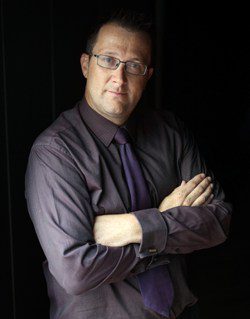Teaching students to make a difference? Then we have to actually listen to them

What’s the point of developing our young people as critical thinkers, if we refuse to take them seriously as soon as they turn informed opinions into action, asks Vic Goddard…

- by Vic Goddard
- Executive principal, author and star of Educating Essex

I received a letter from a year 11 student this week, questioning a school rule regarding our uniform expectations.
What it was specifically about would just muddy the waters; but it was very well written, the spelling and grammar were good and her arguments were clearly presented. We discussed her concerns and I met with her to explain the outcome.
This incident got me thinking about the increased student actions over climate change recently and how we as a school, and the wider system, should respond to such things.
I think it is probably universal that we all wish to create critically thinking individuals who develop their own opinions about the world. If that is the case, then we must accept the fact that they are not going to be happy with every decision that’s been made by this generation, or those that came before.
Direct impact
It is very easy for us to question the ‘real’ motives behind any student activism. The recent events focused on climate change provoked a clear example of how the world treats young people who choose to act.
I am sure that you will have seen a mixture of these words and phrases – snowflakes, neo-liberals, they only want a day off school etc. Some of the nastiest comments were focused on individuals like Greta Thunberg.
It is fair to say that the choice to undertake a ‘strike’ during term time gave people the opportunity to dismiss the young people’s actions as being about having a day off school.
Would it have been more effective and even better attended if it was done during a holiday or weekend? Maybe. Would it have gained as much media coverage? Almost definitely not.
I often use this quote from Margaret Mead: “Never doubt that a small group of thoughtful, committed citizens can change the world; indeed, it’s the only thing that ever has.” What it doesn’t say is “when the people in charge tell you it is OK to do so”!
The right to protest is fundamental in our democratic society; however, it is important that we educate our young people that democracy doesn’t mean because they have asked nicely (or not nicely) that things will definitely change.
The lessons from history show us that successful action must have a direct impact on those with the power to make change happen.
Public opinion is a very powerful motivator for political leaders, but life moves on so quickly in our digital world that the old saying about today’s news and tomorrow’s chip paper does not cover it!
Listen and learn
So, what can schools do? I am sure that almost all of us will have some interaction with learners through a ‘student council’ (or similar), and these could be a very good way of helping our young people to understand how they get things changed/improved in their lives.
However, I wonder how many student councils genuinely effect change? If we are being honest, how many things are open to negotiation that they can talk about?
Do we tell them that they can help inform changes but give them the same old dull subjects to discuss? Is it any wonder that protests happen when there is no route to influence real life, important issues?
At Passmores, we have set our students the challenge of improving what we do with regard to our environmental impact. We have actively engaged with them about the issues and they are seeing real change happen in front of them.
We are looking at new ways of cutting out single use plastic and encouraging a meat free diet. These are changes driven by the students that they can take credit for and be proud of.
We need to encourage informed action not bandwagon jumping. So, rather than simply ignoring our young people or giving them patronising responses, we must encourage debate and dialogue whilst helping them to understand the impact on themselves and the world.
The view that young people should be passive recipients of the world someone else created is not desirable in my eyes; but nor should they be able to make decisions that hurt their futures without us trying to help them avoid that.
Vic Goddard is head Teacher at Passmores Academy – as seen on Channel 4’s Educating Essex – and is the author of The Best Job in the World (Independent Thinking Press, £14.99).










